Impressions from my trip to Ukraine during the war
(All the pictures in this post can be seen at their full resolution here, and my post about the whole trip in a larger context, including Norway and Moldova, can be found here.)
So, how did I end up going to Ukraine during the war? I assure you this was initially not my own idea, but I do pride myself in being convincible. It all started when I met Nadia Gordynsky at my church, when she gave a presentation for her "Save-a-Life International" organization. I was especially interested in her work, as I had recently published my post on abortion, and I was keen on doing something material to actualize my convictions. Her organization was largely centered in Ukraine, with additional branches in the US and Poland. I mentioned to her that I might visit the branch in Poland, since I already had plans to travel to that part of the world - and she countered by suggesting that I actually go to Ukraine!
You could probably guess my initial reaction. "Um... no? What about the war?" But Nadia assured me that things were quite safe in Lviv, in western Ukraine far from the front. And indeed some quick back-of-the-envelope calculations showed that my risks in Lviv due to the war was similar to those posed by a car accident. I was quickly sold.
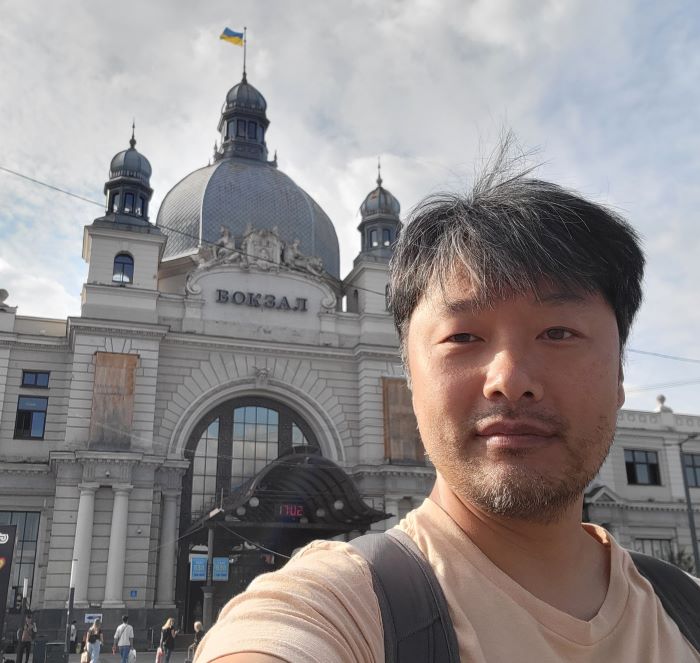
Lviv did turn out to be quite safe. In fact, if you merely walked around in the city center, you wouldn't even know that there was a war going on. It's as one of the locals there told me: foreigners tend to think one of two things about Ukraine, which are both wrong. One is to think that the whole country is on fire. The other, once they actually come to see a city like Lviv, is to think that the war is a joke.
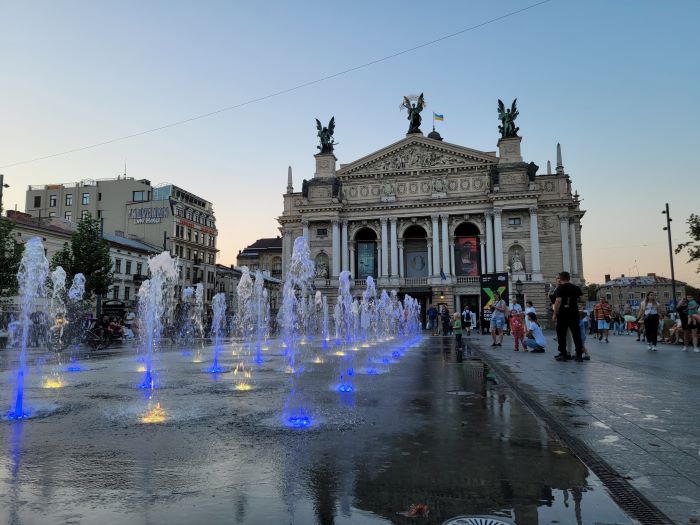
Of course, the truth is more complicated. Lviv has occasional bombings, rocket attacks, and air raid sirens, but for the most part, life goes on. The analogy that came to my mind was that Lviv was like the American home front during World War II. There was very little risk of you dying directly due to the war, yet every aspect of your life would be affected by it, from your economic activities to your friends and family serving in the war. Indeed, if the whole country were on fire, Ukraine would have lost already: without a home front at relative peace, there could be neither the means or the will to continue the fight. And this does mean that Lviv appears to be untouched at a superficial glance.
But if you care to go beyond a walk in the city center, you will find marks of the war everywhere. You can go to the nearby Field of Mars, where the multitude of fallen soldiers are laid to rest. If you had attended the same church service with me, you would have heard a sermon partly about the war. The pastor of that church had lost a good friend in the war, just weeks before I got there. In fact, virtually everyone seemed to know someone who was affected by the war - serving in the war, displaced due to the war, people who fled the country, etc.
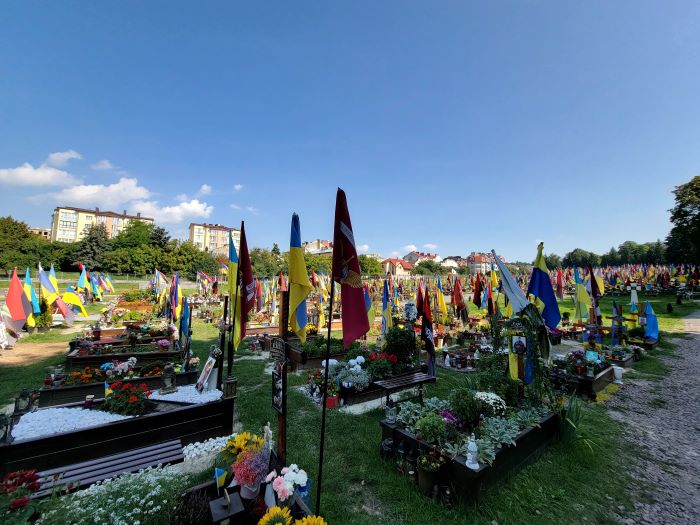
I actually first met such people not in Ukraine, but in Poland, some time before I entered Ukraine. There in Poland I attended the Protestant church nearest to my lodging, and it turned out to be a Ukrainian church. There were many war refugees in the congregation. One of them was an 18 year old girl who still had family back in Kharkiv, in eastern Ukraine some 20 miles from the Russian border. She actually traveled back there to visit them, just a few days before I headed into Ukraine myself. I and many others thought her to be quite brave, and I figured that if she can go to Kharkiv, I can go to Lviv.
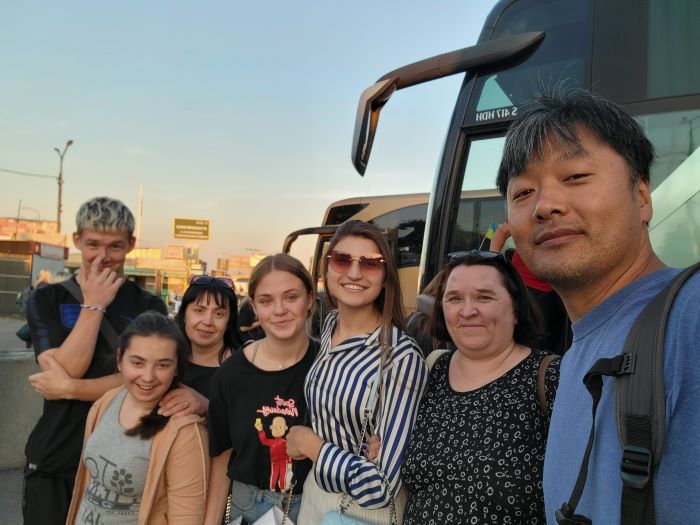
Meeting such remarkable Ukrainians turned out to be one of the highlights of my trip. In fact I liked basically everyone I met, and I can't say enough good things about them. Now granted, there's probably some selection bias here: because of how I came to visit Ukraine, the people I met tended to be Protestant Christians, who are a very small minority among the Christians in Ukraine. They were also largely English-speaking, which meant that they tended to be young, intelligent, and educated. They often had a connection to America, or were at least internationally minded. In any case, I found the people of Ukraine to be very friendly and welcoming, ambitious and entrepreneurial, inquisitive and capable, and passionate about their country and their hope for the future. In fact, they reminded me a lot of Americans, as we're supposed to be - and I cannot help but admire them for some of our traditional American virtues, which may have faded somewhat in ourselves.
To illustrate: I asked a girl there whether she had heard of the musical "Hamilton", and she replied by singing back several lines from its songs. And that felt right: I could believe that they feel what Americans felt during the revolution. I have been cautioned against making this analogy exact, but Ukraine is a new nation drawing on a long-established independent culture, and I got the impression that many Ukrainians can earnestly sing: "hey yo, I'm just like my country, I'm young, scrappy and hungry, and I'm not throwing away my shot!"
But here I have to put in a disclaimer: I'm going to continue to say more things about Ukraine, its people, and the war. But this post is not like some of my other posts, which are meant to be definitive in their conclusions. I was only a tourist, who only visited the country for a short while. I have no special knowledge about the country or the war. My contribution here is that these are my genuine impressions, formed by what I have personally experienced in my limited way with my own senses.
Regardless, the first of my statements should not be controversial: the Ukrainians have an unambiguously righteous cause. Still, it's one thing to understand this intellectually, and another to feel their conviction face to face. This was especially invigorating to me as an American, where many people say that our country is headed in the wrong direction. We have not felt anything like an "unambiguously righteous cause" for a long time. The only possible point of comparison for me was how I felt after 9/11, in the understanding that we were faced with a great evil that required resolute action. And now, it is the Ukrainians who are facing their day of fate.
It then makes a lot of sense for us to want to support Ukraine - and this is where things get tricky. For as the comparison with 9/11 shows, a righteous cause does not necessarily translate into wise actions. Indeed, our mixed military misadventures since 9/11 are the cause of much of our current crisis of confidence, and this in turn only makes us admire the Ukrainians more in their convictions. But our support still calls for wisdom.
As I said to a number of Ukrainians on my trip: we Americans are generally well-intentioned people who want to do the right thing. But our resources are finite, and our many faults are well-known. We are an impatient, forgetful people who are easily distracted (I said this before the current Israel/Hamas conflict). We're often flaky in our commitments to things that don't affect us directly, and we can be quite selfish when we have to start making material sacrifices to our own well-being.
I hope that the top decision-makers in Ukraine and America take these things into account. Again, this is just my opinion, as just an American tourist in Ukraine. But determining the proper level of support for the war requires some hard, honest calculations. We must carefully consider the probability of success for different possible military goals - ranging from the full restoration of Ukrainian territory (with Russians paying reparations), to simply freezing the current front lines in something like a cease-fire. We must also give Russia its due: for as wrong as they are in their aggression, there's no denying that they're a dangerous foe. We must acknowledge our above-mentioned faults, and realistically assess how much America and her allies can support Ukraine as the war continues. I understand that there must be some amount of gamesmanship here, in that we cannot simply show our hand to Russia and reveal the exact limits of our support. But nobody should fool themselves into thinking that this limit doesn't exist, nor do we reveal anything by admitting as much.
But lest anyone think that I'm not for supporting Ukraine - how could that be? How could my trip have done anything but add to my ardor for its people? Yes, our support must be finite - of mathematical, economical, and political necessity. It must be coldly and carefully calculated to include all the messy considerations I mentioned above. And we must strategize and act accordingly. But none of this changes the fact that my own calculations for the "proper level of support" has increased dramatically due to my trip.
Like a bad stereotype, we Americans are currently wringing our hand over how much our support will cost us. Money indeed is the American idol, the one all-consuming common denominator to which all other goods must be converted at its altar. But remember that money must not be an end, but a limited means to acquire other things. It cannot buy truth, nor does it convert well to conviction. But remember also the parable of the shrewd manager: money CAN buy support, connections, and friendships, which can be of eternal and unlimited value. And history shows that when we provide enduring support with this eternal perspective, it can have a transformative effect on some countries (South Korea, West Germany, Japan, etc.), which pays back rich dividends for us and the whole world.
Indeed, I think that we Americans have much to learn from the Ukrainians in this conflict. We're incredibly blessed in our geopolitics, and our wealth and isolation provides us with a great deal of protection. But this can also shield us from reality, and there is much folly in our country because we're not solidly grounded in the truth.
Well, there's no reality like war, and nothing punches through shielding delusions like an invasion. So if you talk to Ukrainians in person, if you see their burning conviction in the righteousness of their cause against a plain evil, then you might come to share their unique grounding in reality. Then we may remember: that there are some things that money can't buy, that right and wrong are real, and that there are eternal principles that we Americans have forgotten.
So then - now what? Am I for spending more money on Ukraine, because of "principles"? Am I for spending less, because we have to be calculating? As I said, I was only a tourist. I do not presume to directly prescribe the U.S. federal budget. Nor, I would guess, do most of my readers. But I do have one solid recommendation. It's something that many of you can actually do, and it'll benefit both you and Ukraine, while upholding solid principles. It's not much, but it's real, and in the end it may be the only thing that actually matters.
I recommend that you visit Ukraine, and get to know the country and the people for yourself.
Of course, this must be a conditional recommendation, with the war and all. Everything I'm going to say here has an "as of the date of this writing" disclaimer to it, as I cannot predict what will happen with the war. The U.S. state department is still giving its highest level of "do not travel" advisory against going to Ukraine. And obviously, you should stay far, far away from anywhere near the war, and take all due precautions. If you still want to go, you should do your due diligence in looking up the latest information, and resolve to be personally responsible for your own safety. But if you do all that, I believe that you can be quite safe, as I have outlined above for my own trip.
The logistics for the trip are ludicrously easy. Assuming you have an American passport, all you have to do is fly in to Poland and take a bus to Ukraine. Lviv is the most obvious destination - and you'll find it to be a beautiful city rich in history and culture. Your tourism will support their economy. Learning their culture will enrich your own understanding of our world, and the connections that bind us all together. And you'll have a great story to tell when you get back home.
While you're there, you may decide that you want to do more to help Ukrainians. You can do so by donating to the following organizations. Again, I'm not an expert here, in that I have no special skill in auditing charities. I specify these organizations because they're the ones that I personally interacted with on my trip: I have talked with their leaders, seen their facilities, met the people they served, and I can say that I'm personally satisfied with the efficacy of their good work. They were each very helpful to me on my trip. I certainly felt much better about supporting them, than clicking on some random "donate to Ukraine" button on Facebook.
- Save-a-life international
- Word of Faith Church in Lublin, Poland
- Hosanna Church in Lviv, Ukraine
- Hebron Academy
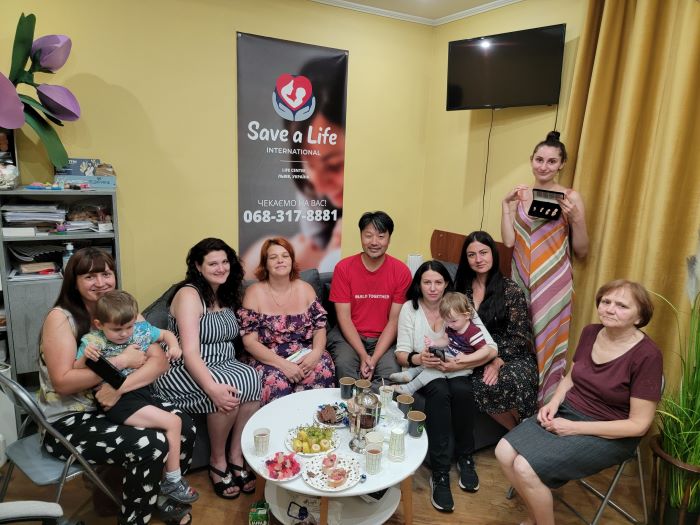
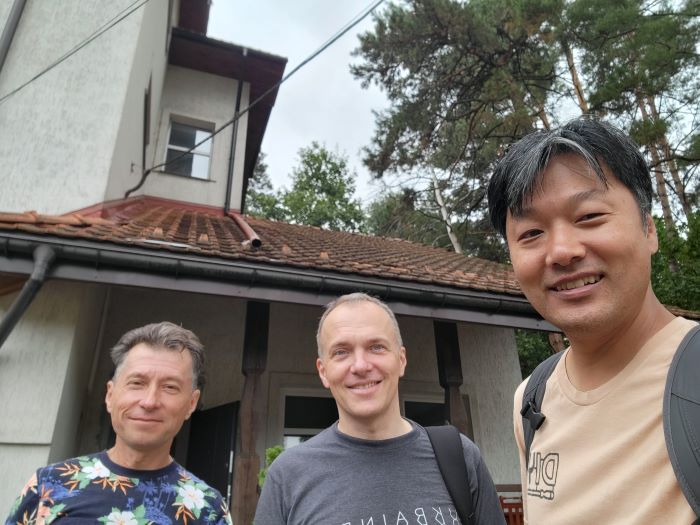
But most of all, talk to the people of Ukraine. Talk to them, get to know them, and listen to their stories. Absorb their values, share in their reality, then go on to tell all this to the rest of the world. I hope you find them to be as friendly and inspirational as I have. Glory to Ukraine - in, by, and through Him who is the alpha and omega of all glory.
You may next want to read:
Leave a Reply
You must be logged in to post a comment.
Post Importance
Post Category
• humanities (22)
• current events (26)
• fiction (10)
• history (33)
• pop culture (13)
• frozen (8)
• math (57)
• personal update (19)
• logic (65)
• science (56)
• computing (16)
• theology (100)
• bible (38)
• christology (10)
• gospel (7)
• morality (17)
• uncategorized (3)